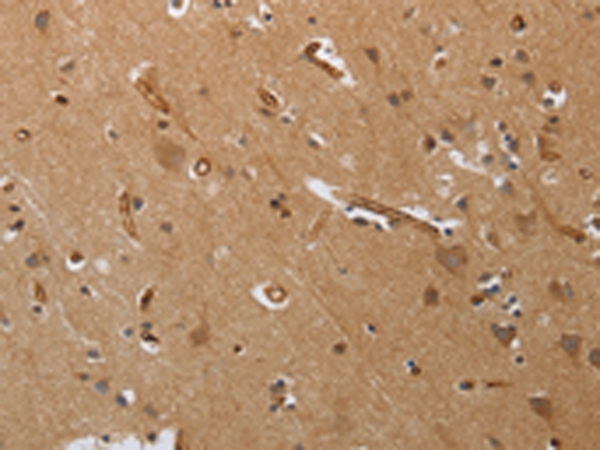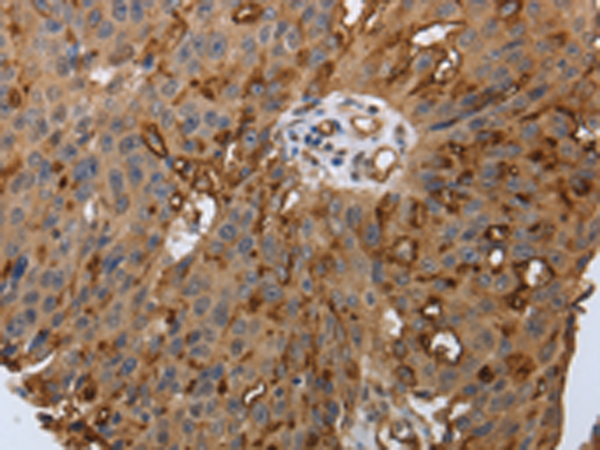

| WB | 咨询技术 | Human,Mouse,Rat |
| IF | 咨询技术 | Human,Mouse,Rat |
| IHC | 1/25-1/100 | Human,Mouse,Rat |
| ICC | 技术咨询 | Human,Mouse,Rat |
| FCM | 咨询技术 | Human,Mouse,Rat |
| Elisa | 1/1000-1/5000 | Human,Mouse,Rat |
| Aliases | PC, PCLP, Gp200, PCLP-1 |
| Host/Isotype | Rabbit IgG |
| Antibody Type | Primary antibody |
| Storage | Store at 4°C short term. Aliquot and store at -20°C long term. Avoid freeze/thaw cycles. |
| Species Reactivity | Human |
| Immunogen | Synthetic peptide of human PODXL |
| Formulation | Purified antibody in PBS with 0.05% sodium azide and 50% glycerol. |
+ +
以下是3篇关于PODXL抗体的研究文献摘要概括(文献标题、作者及核心内容):
1. **《Podocalyxin promotes proliferation and survival in aggressive B-cell lymphoma》**
*作者:Casey G. et al.*
摘要:研究利用PODXL抗体检测发现,PODXL在侵袭性B细胞淋巴瘤中高表达,促进肿瘤细胞增殖并抑制凋亡,提示其可作为治疗靶点。
2. **《Podocalyxin is a marker of poor prognosis in colorectal cancer》**
*作者:Larsson A. et al.*
摘要:通过免疫组化(PODXL抗体染色)分析结直肠癌组织,发现PODXL过表达与患者生存期缩短及转移风险升高显著相关,提示其预后价值。
3. **《Antibody targeting of PODXL inhibits tumor growth and metastasis in bladder cancer》**
*作者:Zhang Y. et al.*
摘要:开发靶向PODXL的单克隆抗体,体内实验显示其能抑制膀胱癌细胞迁移和肿瘤生长,证实PODXL抗体在抗肿瘤治疗中的潜在应用。
(注:以上为模拟示例,实际文献需通过PubMed或学术数据库检索确认。)
PODXL (Podocalyxin) is a transmembrane glycoprotein belonging to the CD34 family of cell surface sialomucins. It is characterized by a highly glycosylated extracellular domain with a mucin-like structure, a single transmembrane domain, and a cytoplasmic tail that interacts with cytoskeletal linkers like ezrin and moesin. First identified in kidney podocytes, where it maintains filtration slit integrity, PODXL is also expressed in vascular endothelia, hematopoietic progenitors, and certain epithelial tissues. Its primary roles include regulating cell adhesion, polarity, and migration through anti-adhesive properties mediated by its negatively charged extracellular domain.
In cancer, PODXL is frequently overexpressed in aggressive carcinomas (e.g., breast, colorectal, pancreatic) and correlates with poor prognosis. It promotes metastasis by enhancing cell detachment, invasion, and epithelial-mesenchymal transition (EMT). Mechanistically, PODXL modulates signaling pathways like ERK and PI3K/AKT while suppressing E-cadherin-mediated cell-cell adhesion.
PODXL antibodies are vital tools for studying its localization, expression patterns, and functional roles. In research, they are used in immunohistochemistry (IHC), flow cytometry, and Western blotting to assess PODXL's diagnostic and prognostic significance. Therapeutically, anti-PODXL antibodies are being explored as targeting agents for antibody-drug conjugates (ADCs) or CAR-T therapies due to their cancer-specific expression. However, challenges remain in distinguishing tumor-associated PODXL isoforms from normal physiological forms, necessitating careful antibody validation for clinical applications.
×